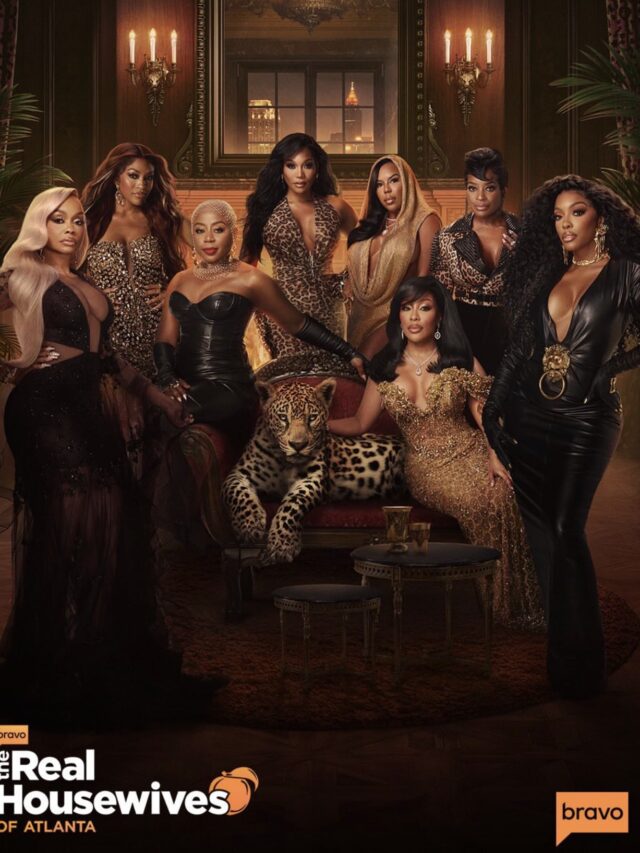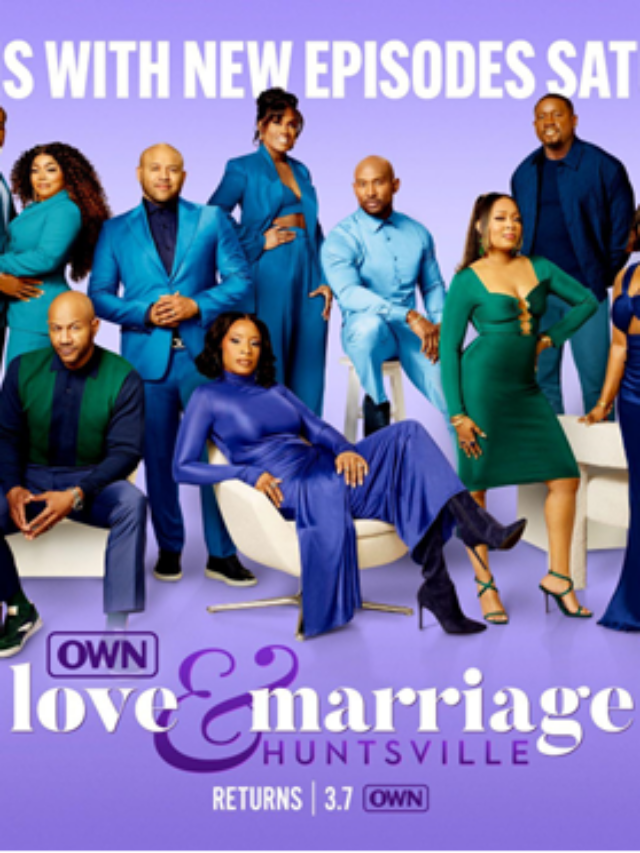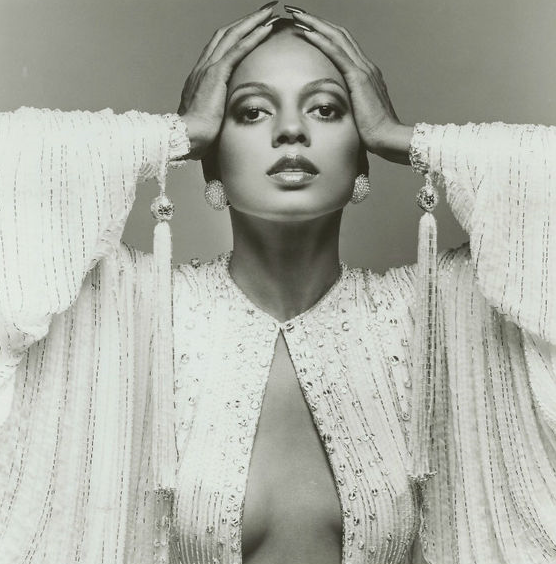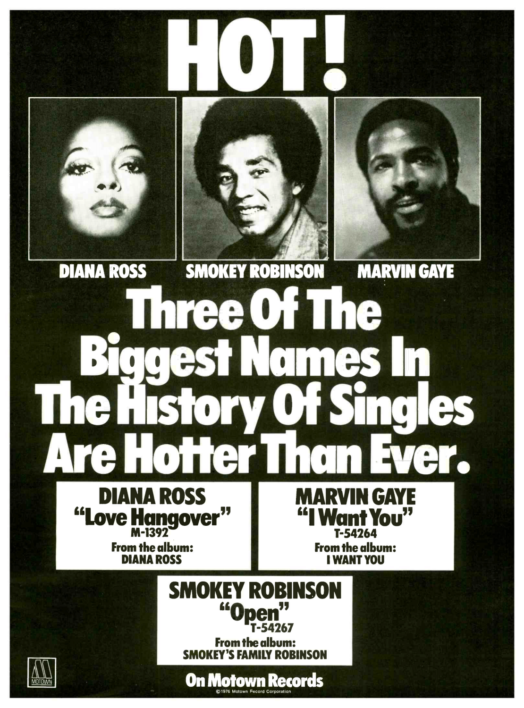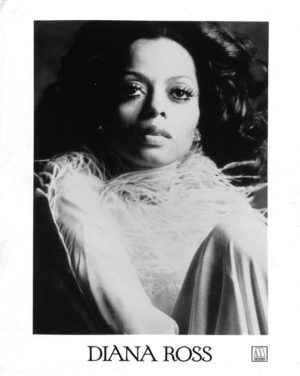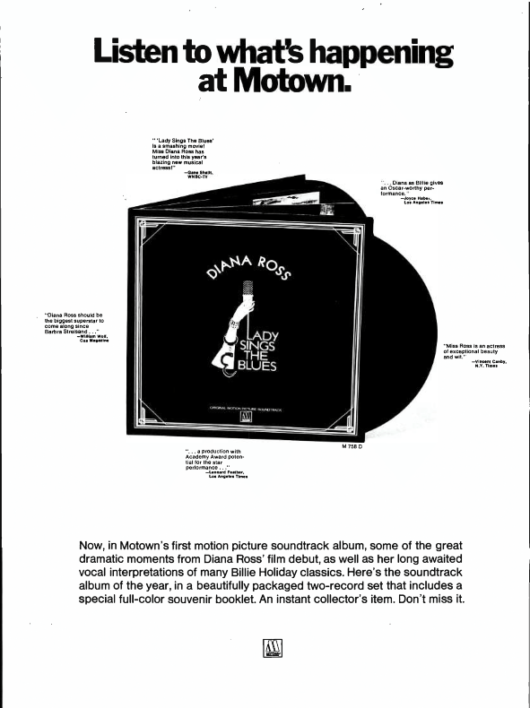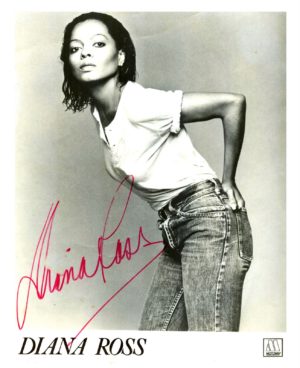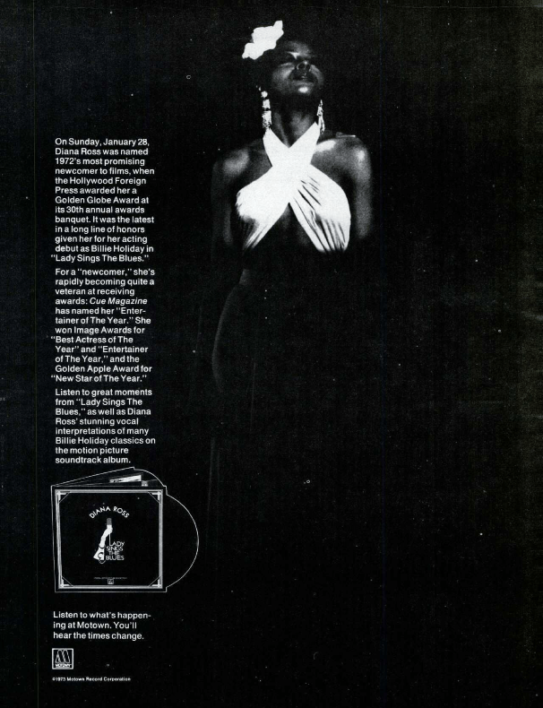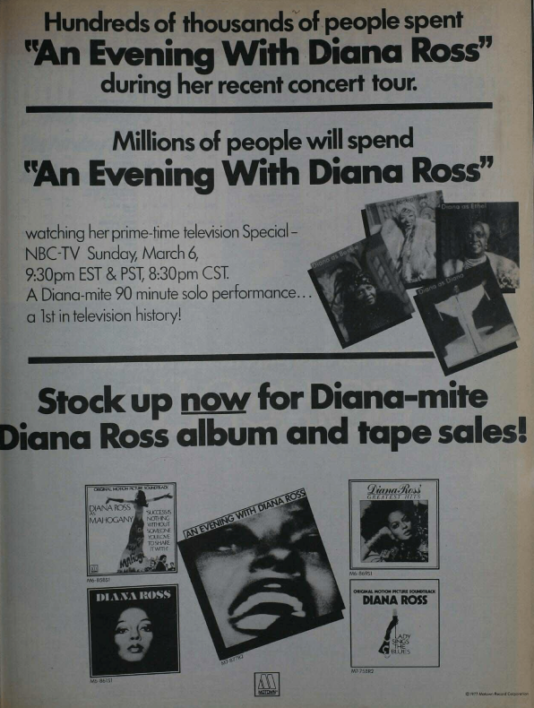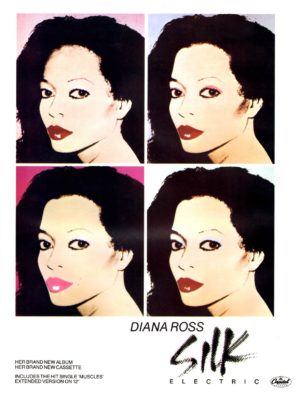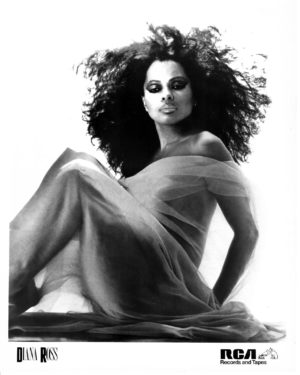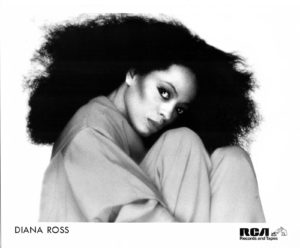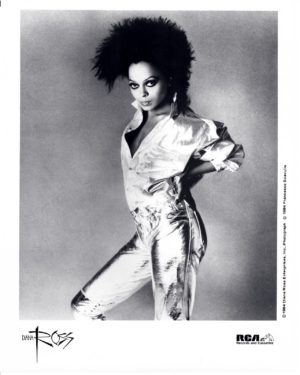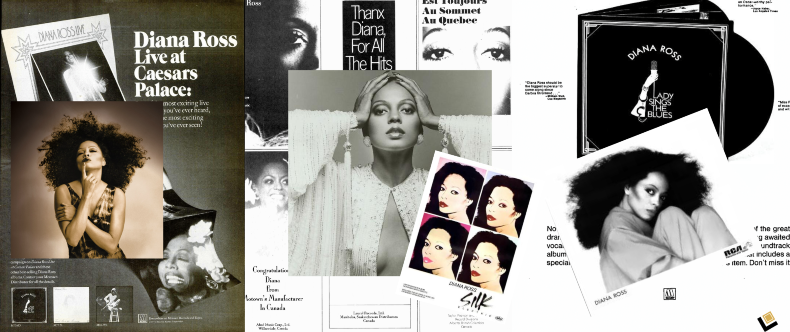
Happy 80th Birthday Diana Ross!
Defining Diana Ross? You couldn’t do that with a three or four-word definition. Or even a picture, supposedly worth a thousand words – and definitely not with one picture, especially of this woman. That’s because defining Diana Ross was a considered choice that happened several times over the course of a career, and a life.
For Diana, even the vocabulary necessary to describe her often needed to be newly-invented – because she repeatedly accomplished things before anyone else did.
Diana, as the lead singer of The Supremes, entered the public stage as part of something that no one had ever seen: a group of three young black women, Diana Ross, Mary Wilson, and Florence Ballard, who, literally weeks out of their teens, suddenly became the embodiment of a new, compelling and original image of America in the world.
With twelve national and international #1/em> pop singles in five years, starting in 1964 with “Where Did Our Love Go” and ending in 1969/70 with “Someday We’ll Be Together,” The Supremes’ record of mainstream success was simply unprecedented – for a female group, for any African-American pop artist, and for the independent black-owned label Motown.
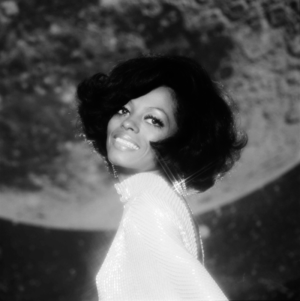 Leaving the group with ambitions of becoming a movie star from her platform as a singer, Ross started the second act of her career under a microscope. Luckily, everyone in the picture at Motown now had a decade’s worth of perspective, not to mention a heavy stake in her future. In the development phase of her first solo album, a series of tracks was produced by Bones Howe, the studio engineer and producer behind the middle-of-the-road pop hits of Fifth Dimension and The Association. (Those tracks, including a cover of Laura Nyro’s “Time and Love,” can be heard on the expanded edition of Ross’s solo debut album.)
Leaving the group with ambitions of becoming a movie star from her platform as a singer, Ross started the second act of her career under a microscope. Luckily, everyone in the picture at Motown now had a decade’s worth of perspective, not to mention a heavy stake in her future. In the development phase of her first solo album, a series of tracks was produced by Bones Howe, the studio engineer and producer behind the middle-of-the-road pop hits of Fifth Dimension and The Association. (Those tracks, including a cover of Laura Nyro’s “Time and Love,” can be heard on the expanded edition of Ross’s solo debut album.)
One can only guess why those songs were shelved, but judging from the song that eventually did come out as her first single, some sense of gravity must have seemed appropriate: Diana Ross couldn’t do something trivial, because her history was too meaningful. “Reach Out and Touch (Somebody’s Hand)” was notable in its failure hit the highest heights of the pop chart at the time, but in retrospect, it seems inevitable that the song would grow so tremendously in the public mind since its 1970 release that it now must be counted among the greatest of American pop standards.
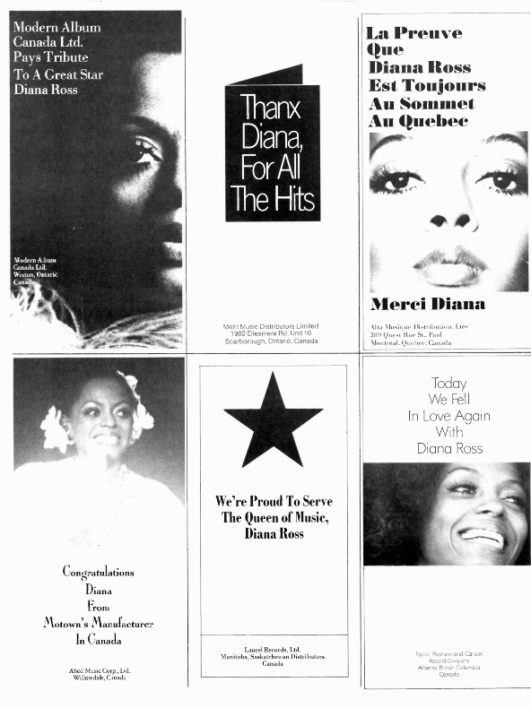
Aiming high and out of the box is certainly part of the reason for the eventual run of Ross hits at very top of the pop and R&B charts. “Ain’t No Mountain High Enough,” the epic gospel/symphonic re-imagining of the Marvin Gaye and Tammi Terrell hit from Motown’s golden era by its original co-writers, Nickolas Ashford and Valerie Simpson, even confounded Motown founder Berry Gordy, who thought it overly long and unstructured – specifically, in the way the chorus lyric ends the song, when it could be starting the song.
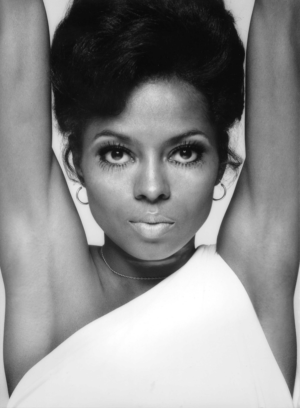 Immediately thereafter, Diana took on her first film role in Lady Sings the Blues (1972), and was Oscar-nominated for her portrayal of Billie Holiday; the soundtrack album of Holiday’s songbook as interpreted by Diana Ross was her most successful album to date. And while that number one album wrapped up its year-long chart run, her complex adult-themed ballad, “Touch Me in the Morning,” put a new song into the list of Motown standards, and unmistakably predicted the later work of Whitney Houston, Anita Baker, Beyonce’ and many others. In the mid-decade, Diana’s sensational pairing with Marvin Gaye produced “My Mistake (Was To Love You),” and the unconventional “Love Hangover” became a breakthrough moment in the overground history of underground club music.
Immediately thereafter, Diana took on her first film role in Lady Sings the Blues (1972), and was Oscar-nominated for her portrayal of Billie Holiday; the soundtrack album of Holiday’s songbook as interpreted by Diana Ross was her most successful album to date. And while that number one album wrapped up its year-long chart run, her complex adult-themed ballad, “Touch Me in the Morning,” put a new song into the list of Motown standards, and unmistakably predicted the later work of Whitney Houston, Anita Baker, Beyonce’ and many others. In the mid-decade, Diana’s sensational pairing with Marvin Gaye produced “My Mistake (Was To Love You),” and the unconventional “Love Hangover” became a breakthrough moment in the overground history of underground club music.
If we just look and listen, it becomes clear that, even as the industry, media and record reviewers questioned with tiresome predictability Ross’ credentials as a ‘soul’ artist – the defining quality of Diana Ross’ best solo work was its striving and exploration, and a straining against conventions, at a time when no creative or personal blueprint existed. It’s shameful, and really boring, that we never, ever recognize this as it’s happening in music, if the label applied is “pop.”
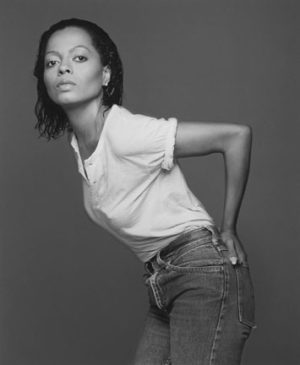 So, it’s up to us, decades later, to point out that “Theme From Mahogany” (from her second film in 1975) and Ashford and Simpson’s late-decade “The Boss” both assess the wisdom that experience brings, and to document the way that the massively influential “Upside Down” and “I’m Coming Out” were crafted for Diana Ross by Chic’s Nile Rodgers and Bernard Edwards with an appropriate respect and acknowledgement of how gracefully she’d assumed pop stardom, movie stardom, superstardom, motherhood and womanhood. (For chapter and verse on this, see Rodgers’ extended interview in the two-disc Deluxe Edition of the diana album.)
So, it’s up to us, decades later, to point out that “Theme From Mahogany” (from her second film in 1975) and Ashford and Simpson’s late-decade “The Boss” both assess the wisdom that experience brings, and to document the way that the massively influential “Upside Down” and “I’m Coming Out” were crafted for Diana Ross by Chic’s Nile Rodgers and Bernard Edwards with an appropriate respect and acknowledgement of how gracefully she’d assumed pop stardom, movie stardom, superstardom, motherhood and womanhood. (For chapter and verse on this, see Rodgers’ extended interview in the two-disc Deluxe Edition of the diana album.)
With one more statement directed at the challenge of choosing the road ahead, “It’s My Turn,” and a superstar pairing with Lionel Richie, “Endless Love,” Diana Ross left Motown in 1981.
Her immediate post-Motown work is imprinted with a sense of empowerment mixed with a certain amount of anxiety – as it would be for anyone who’d just left home for the first time and wanted more than anything to succeed. Alongside a back-to-basics revival of Frankie Lymon and the Teenagers’ “Why Do Fools Fall In Love” and another superstar teaming in the Michael Jackson written and produced “Muscles,” there were the self-examining “Mirror, Mirror,” one of the few songs ever to address the costs of stardom in a non-annoying way; and “Missing You,” written and produced for Ross by Lionel Richie in tribute to late great Marvin Gaye, and inspired by the biggest of big questions: life’s unknowable turns, irretrievable choices and inconsolable hurts.
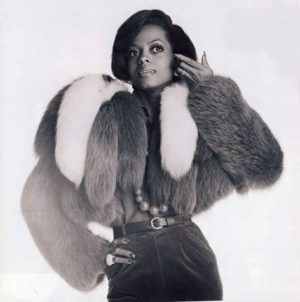 Even the singles that were less critical to her career are never less than winning, among them, the mid-charting “Remember Me,” the unorthodox “Last Time I Saw Him,” (possibly a reference to the ragtime elements of Dawn’s “Tie a Yellow Ribbon ‘Round the Ole Oak Tree”),and the truly unorthodox “Swept Away,” a reflection of the electronics that transformed 80s R&B into hip-hop, co-produced by Daryl Hall and Arthur Baker — the latter, at the time, the hot hand in the music business for his work in hard street beats.
Even the singles that were less critical to her career are never less than winning, among them, the mid-charting “Remember Me,” the unorthodox “Last Time I Saw Him,” (possibly a reference to the ragtime elements of Dawn’s “Tie a Yellow Ribbon ‘Round the Ole Oak Tree”),and the truly unorthodox “Swept Away,” a reflection of the electronics that transformed 80s R&B into hip-hop, co-produced by Daryl Hall and Arthur Baker — the latter, at the time, the hot hand in the music business for his work in hard street beats.
It’s easy to see the ways in which Diana’sown transformation of pop continued to surface, decades later. Lauryn Hill conceived her first solo video, “Doo Wop (That Thing),” was an obvious split-screen visual tribute to Diana Ross, and Destiny’s Child appeared on the cover of Vibe Magazine in flawless Supremes-styled retro glamour.
Clearly, there is substantial opinion among today’s conscious young black women that Diana Ross’ style, accomplishments and songbook will always form a cornerstone of their music.
—————
Diana’s Discography & ‘diana’ Album Spotlight!
Reach Out And Touch (Somebody’s Hand)
(Nickolas Ashford-Valerie Simpson)
Produced by Nickolas Ashford and Valerie Simpson
Arranged by Paul Riser
Issued as Motown single M1165, April 1970
From the album Diana Ross, M711, June 1970
#7 R&B / #20 Pop / #18 AC (Adult Contemporary)Ain’t No Mountain High Enough
(Nickolas Ashford-Valerie Simpson)
Produced by Nickolas Ashford and Valerie Simpson
Arranged by Paul Riser
Originally released on the album Diana Ross, M711, June 1970
Issued as Motown single M1169, July 1970
#1 R&B / #1 Pop (3 weeks) / #6 AC / #6 U.K.Remember Me
(Nickolas Ashford-Valerie Simpson)
Produced by Nickolas Ashford and Valerie Simpson
Arranged by Paul Riser
Originally released as single Motown 1176, December 1970
From the album Surrender, M723, June 1971
#10 R&B / #16 Pop / #20 AC / #7 U.K.
Good Morning Heartache
(Irene Higginbotham-Ervin Drake-Dan Fisher)
Arranged by Oliver Nelson
Executive Producer: Berry Gordy
Originally released on the soundtrack album Lady Sings The Blues, M758, October 1972
Issued as Motown single M1211, December 1972
#20 R&B / #34 Pop / #8 ACLove Hangover
(Pam Sawyer-Marilyn McLeod)
Produced by Hal Davis
Arranged by David Blumberg and Clay Drayton
Executive Producer: Berry Gordy
Originally released on the album Diana Ross, M861, February 1976
Edit issued as Motown single M1392, March 1976
#1 R&B / #1 Pop / #19 AC / #10 U.K.The Boss
(Nickolas Ashford-Valerie Simpson)
Produced by Nickolas Ashford and Valerie Simpson For Hopsack & Silk Productions, Inc.
Rhythm and Vocal Arrangement by Nickolas Ashford and Valerie Simpson
Rhythm arrangement by Ray Chew
Horn and String Arrangement by John Davis
Issued as Motown single M1462, May 1979
From the album The Boss, M923, May 1979
# 12 R&B / #19 Pop / #41 AC / #40 U.K.Diana Ross was six years into her wildly successful solo career from the Supremes when she outdid herself, releasing a self-titled project, her seventh studio album, that included two No. 1 pop smashes, “Theme from Mahogany (Do You Know Where You’re Going To)” and the dance-floor classic, “Love Hangover.” Ms. Ross also took two more tracks from the album up the charts, “I Thought It Took A Little Time (But Today I Fell In Love),” which hit the top five of Billboard magazine’s Easy Listening (now known as Adult Contemporary) chart, and “One Love In My Lifetime,” no. 5 on the Soul charts. Diana Ross, the album, peaked at no. 5 on the Billboard 200, no. 4 on the Soul album chart and no. 5 in the U.K.
“Theme from Mahogany (Do You Know Where You’re Going To)” was taken from the soundtrack to the Mahogany film, a Ross vehicle that followed her Oscar-nominated role in Lady Sings The Blues. A cover of a Thelma Houston recording from 1973, the song anchored a romantic drama, produced by Motown and directed by Berry Gordy, in which Ross, as Tracy Chambers, a poor woman from the Chicago projects who works her way up from salesgirl to supermodel, becomes a famous fashion designer. Written by Michael Masser and Gerald Goffin, “Theme from Mahogany” hit No. 1 on the Billboard Hot 100 and the Easy Listening (AC) charts, and received an Oscar nomination for Best Song. It had already been weeks past its No. 1 status when included on the Diana Ross album and, on March 29, 1976, when Ms. Ross performed it live via satellite from the Netherlands on that year’s 48th Academy Awards telecast.
Ross was on top of the world, as “Love Hangover” from Diana Ross was the U.S. No. 1 pop song the same week as the Oscars. “Love Hangover” was an accidental hit, rush-released while the album’s first single, “I Thought It Took A Little Time (But Today I Fell in Love),” was on its way up the charts, to circumvent a competing version by The 5th Dimension. Written by Pamela Sawyer and Marilyn McLeod as either a ballad or up-tempo track, the song was famously recorded as both and cut together, creating an unforgettable backing track for Ms. Ross’ unforgettably sexy vocals. Producer Hal Davis created a comfortable atmosphere for Ms. Ross, installing a strobe light in the studio, which elicited from her a playful, sensual performance. When “Love Hangover” reached No. 1 on the Billboard Hot 100 for two weeks – it also hit No. 1 on the Soul and Dance/Disco charts – it was Ross’s fourth chart-topping solo single, breaking the then-record for most number one hits by a female vocalist, a record eventually broken by Whitney Houston in 1988 and Madonna in 1990. The song was eventually nominated for a GRAMMY® for Best R&B Female Vocal Performance. And it reappeared at the top of the charts as the sampled foundation of “The First Night,” a No. 1 hit for Monica in 1998.
The fourth hit from Diana Ross, “One Love in My Lifetime,” written by Lawrence Brown, Terri McFadden and Leonard Perry, hit the Top 10 on the U.S. Soul chart and peaked at 25 on the Pop chart. The song was covered by Joss Stone for her 2012 album, The Soul Sessions Vol. 2. Among the other album highlights are Ross’ swooning, romantic take on the Charlie Chaplin classic, “Smile,” which closes the record.
Ross performed many of the songs from the album on her subsequent tour, which resulted in the 1977 live album, An Evening with Diana Ross, a Broadway run that won a special Tony Award, and an Emmy-nominated TV special.
Diana Ross is a music staple, made all the more iconic by its extraordinary close-up cover shot by famed fashion photographer Victor Skrebneski – an image that differentiates the album from Ms. Ross’ other self-titled album, her solo debut in 1970, which featured a full-body shot by another renowned photographer, Harry Langdon.
I’m Coming Out
(Bernard Edwards-Nile Rodgers)
Produced by Bernard Edwards & Nile Rodgers for the CHIC Organization
Originally scheduled for release as Motown single M1491, June 1980 (cancelled); issued August 1980
From the album diana, M936, March 1980
#6 R&B / #5 Pop / #1 Dance / #13 U.K.Upside Down
(Bernard Edwards-Nile Rodgers)
Produced by Bernard Edwards & Nile Rodgers for the CHIC Organization
Originally released on the album diana, M936, March 1980
Issued as Motown single M1494, June 1980
#1 R&B / #1 Pop / #1 Dance / #18 AC / #2 U.K.Theme From Mahogany (Do You Know Where You’re Going To)
(Michael Masser-Gerry Goffin)
From a Berry Gordy film, Mahogany, A Paramount Picture
Produced by Michael Masser
Arranged by Michael Masser and Lee Holdridge
Issued as Motown single M1377, September 1975
From the soundtrack album Mahogany, M858, October 1975
Also appeared on the album Diana Ross, M861, February 1976
#14 R&B / #1 Pop / #1 AC / #5 U.K.Mirror, Mirror
(Michael Sembello-Dennis Matkowsky)
Produced by Diana Ross for Diana Ross Productions
Arranged by Ray Chew
Horns arranged by Randy Brecker
Issued as RCA single PB-13021, December 1981
From the album Why Do Fools Fall In Love, RCA AFL1-4153, September 1981
1981 BMG Music
#2 R&B / #8 Pop / #14 Dance / #36 U.K.Why Do Fools Fall In Love
(Frankie Lymon-Morris Levy)
Produced by Diana Ross for Diana Ross Productions
Arranged by Rob Mounsey
Horns & Strings arranged by Bert De Coteaux
Issued as RCA single PB-12349, October 1981
From the album Why Do Fools Fall In Love, RCA AFL1-4153, September 1981
1981 BMG Music
#6 R&B / #7 Pop / #2 AC / #4 U.K.Muscles
(Michael Jackson)
Produced by Michael Jackson
String arrangements by William F. Reichenbach
Issued as RCA single PB-13348, September 1982
From the album Silk Electric, RCA AFL1-4384, September 1982
1982 BMG Music
#4 R&B / #10 Pop / #36 AC / #15 U.K.
It’s My Turn
(Michael Masser-Carole Bayer Sager)
Produced by Michael Masser
Rhythm Arrangement by Michael Masser and Barry Fasman
String Arrangement by Lee Holdridge
Executive Producer: Suzanne de Passe Le Mat
Issued as Motown single M1496, October 1980
From the soundtrack album It’s My Turn, M947, October 1980
Also appeared on the album To Love Again, M951, February 1981
#14 R&B / #9 Pop / #9 AC / #16 U.K.Missing You
(Lionel Richie)
Produced by Lionel Richie and James Anthony Carmichael
Issued as RCA single PB-13966, April 1984
From the album Swept Away, RCA AFL1-5311, August 1984
1984 BMG Music
#1 R&B (3 weeks) / #10 Pop / #4 ACTouch Me In The Morning
(Ron Miller-Michael Masser)
Produced by Michael Masser and Tom Baird
Arranged by Tom Baird and Gene Page
Executive Producer: Berry Gordy
Issued as Motown single M1239, May 1973
From the album Touch Me In The Morning, M772, May 1973
#5 R&B / #1 Pop / #1 AC / #9 U.K.Last Time I Saw Him
(Pam Sawyer-Michael Masser)
Produced by Michael Masser
Arranged by Michael O’Martian and Gene Page
Issued as Motown single M1278, December 1973
From the album Last Time I Saw Him, M812, December 1973
#15 R&B / # 14 Pop / #1 AC (3 weeks)My Mistake (Was To Love You) duet with Marvin Gaye
(Pam Sawyer, Gloria Jones)
Produced by Hal Davis
Arranged by Dave Blumberg
Issued as Motown single M1269, January 1974
From the album Diana and Marvin, Motown M803, October 1973
#15 R&B / #19 PopSwept Away
(Daryl Hall-Sara Allen)
Produced by Daryl Hall and Arthur Baker
Issued as single RCA 13864(5), August 1984
From the album Swept Away, RCA AFL1-5009, August 1984
#3 R&B / #19 Pop / #1 Dance (2 weeks)Endless Love duet with Lionel Richie
(Lionel Richie)
Produced by Lionel Richie
Arranged by Gene Page
Issued as Motown single M1519, June 1981
From the soundtrack album Endless Love, Mercury SRM-1-2001, June 1981
Also appeared on the album All The Great Hits, M960, October 1981
#1 R&B / #1 Pop / #1 AC (3 weeks) / #7 U.K.What A Diff’rence A Day Makes
(Stanley Adams-María Mendez Grever)
Produced, Arranged and Conducted by Gil Askey
From the unreleased album Blue, Motown M749, now available as Motown/UMe B0005694-02, released June 20, 2006
Watch Classic Clips




